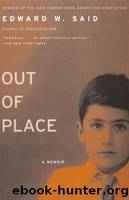Out of Place: A Memoir by Said Edward W

Author:Said, Edward W. [Said, Edward W.]
Language: eng
Format: epub
Tags: Biography & Autobiography, Politics, Social Scientists & Psychologists, Biography, History, Philosophy
ISBN: 9780307829641
Google: aMjITElwSU0C
Amazon: B009JU5ICC
Goodreads: 16054627
Publisher: Vintage
Published: 1999-01-01T08:00:00+00:00
VIII
I HAD NO WAY OF KNOWING IT, BUT WHEN I ENTERED Victoria College in the autumn of 1949, aged almost fourteen, I was also nearing the last two years of my life in Cairo. For the first time I became âSaidâ exclusively, my first name either unknown or shortened to âEâ; and as plain âSaidâ I entered a mongrel world made up of miscellaneous last namesâZaki, Salama, Mutevellian, Shalomâof very mixed provenance, all of them preceded by dangling, not to say irrelevant, first initials: Salama, C, and Salama, A, for instance, or Zaki, whose two first initials served as a mockingly reversed and cacophonous sobriquet for him, âZaki A.A.â or âZaki Ack Ack.â
Before school began I said to my mother that I was interested in becoming a doctor, to which she said that my father and she would be happy to buy me my first clinic. Both of us understood that the gift would be made in Cairo, although we both were also aware that Cairo couldnât in the long run be our home for âthe futureâ as we imagined it. Reports of mysterious assassinations and abductions, mostly of well-known prominent men who had good-looking wives, testified to the influence of a corpulent, libidinous king whose nocturnal rampages and long European holidays had dislocated the country as much as the scandals of the 1948 Palestine war, in which faulty arms, incompetent generals, and a formidable enemy had not only routed the Egyptian army but brought the tottering, still not really independent Egyptian state to a new, low pass. The sudden prominence of the Muslim Brothers lent more anxious uncertainty to those of us Arabs who were neither Egyptian nor Muslim. A constant guerrilla struggle in the Suez Canal Zone, to which British forces had retreated, elevated the guerillas or fedayin (an Islamic epithet denoting warlike sacrifice) who fought the foreigners to the status of heroes, and also made our working relationships in Cairo with English doctors, nurses, teachers, bureaucrats far more tense than before.
I felt this the moment I set foot in Victoria College, later described to me by Mr. Hill, the geography master, as a school designed to be the Eton of the Middle East. Except for the teachers of Arabic and French, the faculty was entirely English, though unlike at GPS not a single English student was enrolled. My father drove me to schoolâlocated in temporary quarters at the former Italian School in Shubra, one of Cairoâs most densely populated semislum areas, not far from Dr. Haddadâs clinicâand on the first day left me at the front door with his usual cheery âGood luck, sonâ as he drove off with his driver. For the second time (after GPS) in my life I was dressed in a school blazer, gray trousers, blue-silver striped tie and cap: a uniform (bought at Avierinoâs) proclaiming me a VC boy, engendering a feeling of miserable solitude and profound uncertainty as I edged my way into the bustling corridors about five minutes before the school bell went off at eight-thirty.
Download
This site does not store any files on its server. We only index and link to content provided by other sites. Please contact the content providers to delete copyright contents if any and email us, we'll remove relevant links or contents immediately.
Born to Run: by Christopher McDougall(7127)
The Leavers by Lisa Ko(6948)
iGen by Jean M. Twenge(5415)
Sapiens by Yuval Noah Harari(5370)
Spare by Prince Harry The Duke of Sussex(5196)
The Kite Runner by Khaled Hosseini(5178)
Machine Learning at Scale with H2O by Gregory Keys | David Whiting(4313)
Bullshit Jobs by David Graeber(4190)
Never by Ken Follett(3955)
Goodbye Paradise(3810)
Livewired by David Eagleman(3772)
Fairy Tale by Stephen King(3396)
A Dictionary of Sociology by Unknown(3085)
Harry Potter 4 - Harry Potter and The Goblet of Fire by J.K.Rowling(3073)
The Social Psychology of Inequality by Unknown(3029)
The Club by A.L. Brooks(2925)
Will by Will Smith(2919)
0041152001443424520 .pdf by Unknown(2845)
People of the Earth: An Introduction to World Prehistory by Dr. Brian Fagan & Nadia Durrani(2736)
